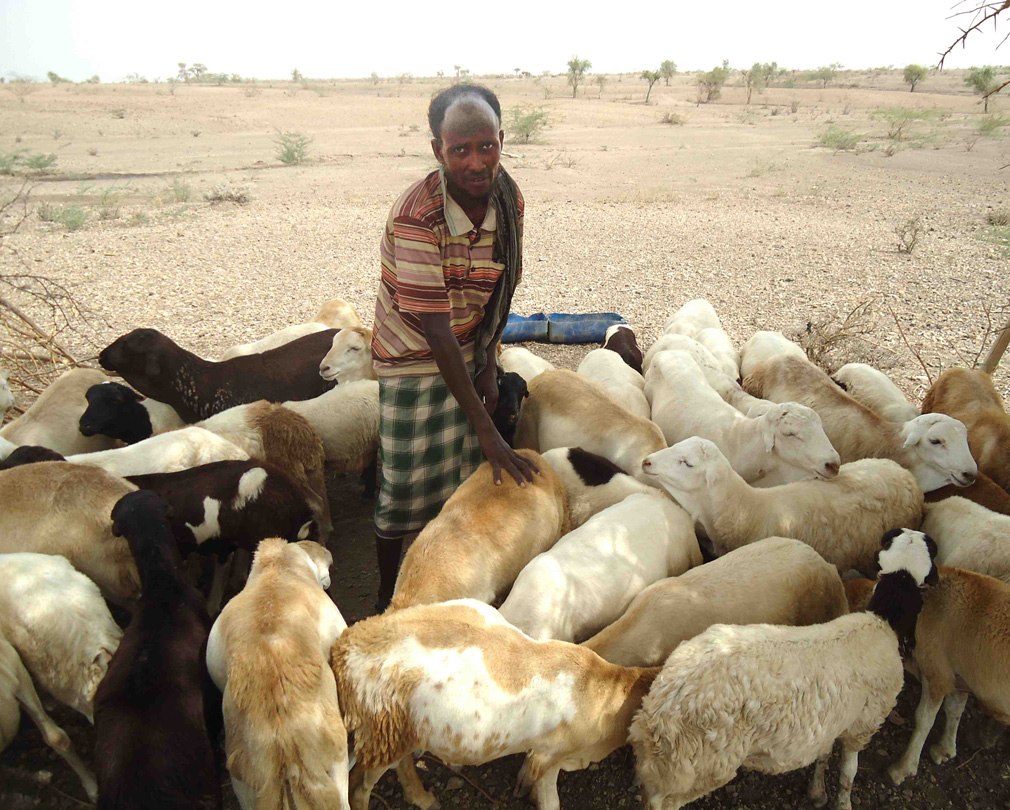

Coping with environmental change in Ethiopia

By Claire Balbo
Climate change has hit hard in the Afar Region of Eastern Ethiopia. Ali Hamadu lost all his livestock as a result of five years of drought. Once a thriving pastoralist, Ali and his wife and three children were reduced to depending on food aid from the government and humanitarian organizations.
“I was previously a respected figure in my community for my wealth, having nearly a hundred heads of animals, including sheep, goats and cattle. All of a sudden, I had nothing,” he explains. Depending on food aid, Ali says, made him feel desperate.
In Ethiopia, pastoralist communities constitute 14% of the total population and have among the highest rates of poverty and the lowest human development indices. With their large numbers of livestock, they have been accused of overgrazing and causing land degradation. Because the health of their animals is so weather-dependent, pastoralists are seen as being particularly vulnerable to climate change.
Since the drought began in 2008, many pastoralists have migrated away from their traditional encampments in search of food and water for their animals. Some have already given up pastoral life and moved to urban areas looking for a better life. But others are still in their native area waiting for miraculous changes from nature.
Adapting to climate change
To help pastoralists like Ali face the effects of climate change, the MDG-Fund has been working with the Ethiopian government to provide long-term adaptation tools to individual pastoralists and to mainstream climate change mitigation and adaptation into the country’s development plans, strategies and policies.
Specifically, the joint UN programme, “Enabling Pastoral Communities to Adapt to Climate Change and Restoring Rangeland Environments” has developed water facilities and created activities to improve livelihoods for 32,000 pastoralists in some of Ethiopia’s most geographically isolated, vulnerable and impoverished areas.
Ali is now a member of Jeldi Livestock Marketing Cooperative, which was established with seed money from the MDG-Fund and comprises 172 household heads, of which 37 are women. Activities of the cooperative include buying sheep for low cost from community members and fattening them for resale at a higher price.
Just a year old, Jeldi Cooperative is already making a profit to be shared among its members, including Ali. The Jeldi Cooperative is one of three created in this area of Afar region; the Joint Programme has established similar cooperatives in another area as well as in three other regions of the country.
“In addition to the profit shared, I earn Birr 500 (US$27) per month by taking care of the sheep. I am now able to satisfy my household needs, unlike in the hard times of the last couple of years,” Ali says.
Towards environmental sustainability
The programme, a collaboration between three UN agencies (UNDP, FAO and UNEP) and the Ethiopian government, is one of five joint programmes in Ethiopia funded by the MDG-Fund as part of its efforts to help countries around the world accelerate progress towards the MDGs, with an emphasis on reaching the most disadvantaged communities. This programme targets MDG 7, ensuring environmental sustainability.
The programme has focused on developing water facilities, rangeland management activities and cooperatives to improve pastoral communities’ abilities to cope with climate change, while maintaining their traditional livelihoods and way of life.
It has also worked to mainstream climate change mitigation and adaptation into national, regional and district development frameworks, and to build capacity and provide trainings for government agencies and pastoralist community institutions to effectively respond to the risks and challenges of climate change.
Project administrators say the programme’s initiatives are catching on. “Seeing the changes in livelihood of cooperative members, other pastoralists are frequently asking our office to organize them and facilitate the establishment of cooperatives,” explains Firehiwot Mattewos, of the Ada’ar District Cooperatives Office.
“Community members hoping for a bright future and searching for alternative livelihood schemes see a successful beneficiary, such as Ali Hamadu from Jeldi Cooperative, as a role model,” she says.